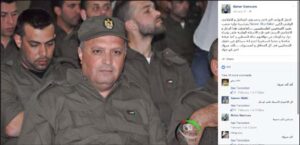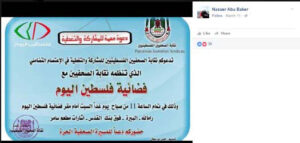The Palestinian Journalists’ Syndicate is calling for the revocation of the press credentials of the director of Agence France Presse’s Ramallah bureau and also urged a boycott of the journalist following the French news agency’s dismissal of long-time Palestinian reporter Nasser Abu Baker, who moonlights as a Fatah-affiliated activist, an inherent conflict that CAMERA exposed in 2016 (“‘Rigorous Neutrality?’ Palestinian Journalists’ Syndicate’s Nasser Abu Baker Moonlights for AFP“).
As detailed in CAMERA’s exclusive investigation at the time, Abu Baker’s anti-Israel, political activity as a senior official at the Palestinian Journalists’ Syndicate embodied the Palestinian Authority’s ideal of “journalism in the service of the revolution.” As explained by a senior Palestinian Authority official (quoted by Israeli reporter Yoni Ben-Menachem who was later the target of a threatening Fatah video against Israeli journalists):
We are in the middle of a revolution to establish a state and criticism of the regime and the leadership harms our struggle, and so we adopted the term “journalism in the service of the revolution” (Sahafat Ath-Thawra). Every journalist in the Palestinian Authority territory knows his limits and exercises self-censorship in order not to exceed the red lines. Whoever crosses them is punished.
“Journalism in the service of the revolution” cannot possibly coexist with AFP’s values, which state:
Objectivity is a difficult goal to achieve. The mere unavoidable organisation of facts can influence a reader’s judgement. However, this does not prevent us from pursuing our policy of rigorous neutrality. According to its remit, AFP is independent of the French government and all other economic or political interests.
 Abu Baker’s inherent conflict of interest was underscored by the 2016 Fatah Revolutionary Council elections in which he contended as a candidate and simultaneously covered. Following CAMERA’s exposure of his multiple misdeeds, including his forbidden participation in a political race which he covered, AFP imposed a brief, week-long suspension of Abu Baker.
Abu Baker’s inherent conflict of interest was underscored by the 2016 Fatah Revolutionary Council elections in which he contended as a candidate and simultaneously covered. Following CAMERA’s exposure of his multiple misdeeds, including his forbidden participation in a political race which he covered, AFP imposed a brief, week-long suspension of Abu Baker.
As CAMERA documented in 2016, Abu Baker used his position at PJS to call for a boycott of Israeli journalists, thereby endangering their safety and curtailing their activity in the Palestinian territory. His activity was a clear violation of AFP’s “golden rules” to serve “truth, impartiality and plurality.”
In addition, CAMERA’s original 2016 investigation demonstrated how Abu Baker’s position as head of the Palestinian Journalists’ Syndicate compromised his reporting at AFP. CAMERA reveled that in a June 2015 article, Abu Baker falsely alleged that “[s]ome 17 journalists were killed covering the July-August [2014] Gaza war.” At the time he was deputy chairman of the PJS. As CAMERA noted already in 2015, the AFP did not attribute the claim to any source. A report by the Meir Amit Intelligence and Terrorism Information Center (ITIC) stated:
About a week after the end of Operation Protective Edge the Palestinian Journalists Syndicate issued a list of 17 names, allegedly of journalists who had been killed in [the summer 2014 Gaza] operation. The list was published by the PA’s Wafa News Agency, which received it from the Hamas-controlled Gaza office of the ministry of information.
About the Palestinian Journalists Syndicate, the ITIC explained:
The Palestinian Journalists Syndicate is a trade union established in 1979, originally located in Jerusalem. Today its main offices are in Ramallah and it has a branch in the Gaza Strip controlled, in ITIC assessment, by Hamas. Its chairman is Abd al-Nasser al-Najar, who has two deputies, Nasser Abu Bakr in Judea and Samaria and Tahsin al-Astal in the Gaza Strip (Website of the Palestinian Journalists Syndicate, February 4, 2015).
As the ITIC detailed, and as CAMERA communicated to AFP editors in 2015, eight of the 17 on the Hamas/PJS list were Hamas and Palestinian Islamic Jihad terror operatives or worked for Hamas or Islamic Jihad media outfits.
As a result of CAMERA’s communication with AFP, the agency amended the reported, attributing the claim to Hamas-run information center and adding the information from the Meir Amit center that eight of the so-called journalists were actually Hamas or Islamic Jihad members.
In another instance of conflicting interests that CAMERA uncovered in 2016, AFP reported on the arrest of Omar Nazzal, “a member of the general secretariat of the Palestinian Journalists Syndicate,” who, according to the Shin Bet security service was detained due to his “involvement in terror group activities” (“Israel detains Palestinian journalist without trial,” May 2).

Nasser Abu Baker, wearing a Palestinian Authority military uniform (Source Facebook, Jan. 31, 2016)
The article neglected to note that Falestine al-Youm, or Palestine Today, is affiliated with Islamic Jihad, a terrorist organization according to the EU and theUS.
The article also omitted to note that the Shin Bet said that Nazzal took part in “unlawful activity” for the Popular Front for the Liberation of Palestine, also a terrorist organization according to the EU and the US.(Blogger Elder of Ziyon
pointed out that Nazzal’s articles appear on the PFLP site.) No byline accompanies the article. There is no way to know what role, if any, AFP’s Nasser Abu Baker played in an article about the arrest of his PJS colleague for terror-related activities.

Abu Baker’s March 11, 2016 Facebook post of the PSJ flier calling for a sit-in in solidarity with Palestine Today
CAMERA’s 2016 exposé was also the first to report Abu Baker’s wild accusations against Israel, including
his completely unfounded allegation that Israeli hospitals are treating 5000 ISIS members and his call on the Arab media: “We asked Arab media people to intensify their effort to expose the Nazi and racist crimes of the Israeli occupation against the Palestinian people and to bring back the Palestinian cause to the center of the Arab media’s attention.”Despite his brief 2016 suspension, Abu Baker has remained undeterred, maintaining his political activity alongside his employment with AFP. In May, he confirmed his support of journalism in “support of the Palestinian struggle.” As
reported by the official WAFA news agency:
PJS president, Nasser Abu Baker, told the crowd that the Palestinian journalists were able to professionally present to the world the true picture of the Israel war on Gaza, which was the reason for the world’s support for the Palestinian struggle.
In the name of presenting the “true picture,” Abu Baker has falsely
accused Israel of planning a “terrible massacre” of Palestinian journalists and called for Israel’s exclusion from “
membership to all forums concerned with freedom of expression and human rights and demanded the announcement of the formation of an international commission to investigate Israel’s crimes against journalists.” To that end, PJS reported: “Palestinian journalist Yousef Abu Hussein was killed in an Israeli airstrike on his home in the Gaza Strip.” Journalism in the service of the revolution apparently compelled PJS to ignore the fact that “journalist” Yousef Abu Hussein worked for Hamas’ Al-Aqsa Voice, and was thus a member of the propaganda wing of a terror organization. (Al Aqsa Voice has praised Palestinian terrorists for murdering civilians including Rina Schnerb, Kim Levengrund-Yehezkel and Ziv Hajbi, Eitam and Naama Henkin, Michael Mark, and Raziel Shevach, among countless others. Abdullah Naser Khalil Fahjan, an Izz al-Din al-Qassam Brigades terrorist operative who also apparently worked as a reporter for Hamas’ Voice of Al-Aqsa Radio, was one of the eight terrorists killed in 2014 whom PJS misidentified as a journalist, according to ITIC.)
“The PJS, in cooperation with international journalists, is compiling a file about Israeli crimes against journalists to be presented to the International Criminal Court,” Abu Baker was quoted.
Following the AFP’s dismissal of Abu Baker, the Palestinian Journalists’ Syndicate
alleged that the news agency’s “d
ecision came as a result of the submission of The French News Agency in Jerusalem to the pressures of the Israeli occupation, and the successive campaigns of incitement against Nasser Abu Bakr.”In a statement emailed to journalists, AFP responded:
AFP came under no pressure from either the Palestinian or Israeli authorities in its decision to dismiss the journalist Nasser Abu Bakr. To declare that external pressure was placed on AFP is a serious and unacceptable attack on the reputation of the Agency, whose statutes guarantee its independence. AFP decided to part way with Nasser Abu Bakr exclusively for professional reasons, following several months of fruitless exchanges with him.
AFP regrets Mr. Abu Bakr’s decision to launch a smear campaign against the Agency and views certain statements as unacceptable incitements to violence against its staff, punishable under Palestinian law.
Five years after AFP’s minimal steps to rein in Abu Baker’s wholly unprofessional and unethical calls for boycotting and threatening Israeli journalists and Palestinians who speak with them, the news agency today finds itself the target of his incitement and boycott campaigns. Albeit belatedly, AFP finally appears to be standing up resolutely against Abu Baker’s bullying in the service of the revolution.
With research by CAMERA Arabic
 Abu Baker’s inherent conflict of interest was underscored by the 2016 Fatah Revolutionary Council elections in which he contended as a candidate and simultaneously covered. Following CAMERA’s exposure of his multiple misdeeds, including his forbidden participation in a political race which he covered, AFP imposed a brief, week-long suspension of Abu Baker.
Abu Baker’s inherent conflict of interest was underscored by the 2016 Fatah Revolutionary Council elections in which he contended as a candidate and simultaneously covered. Following CAMERA’s exposure of his multiple misdeeds, including his forbidden participation in a political race which he covered, AFP imposed a brief, week-long suspension of Abu Baker.

